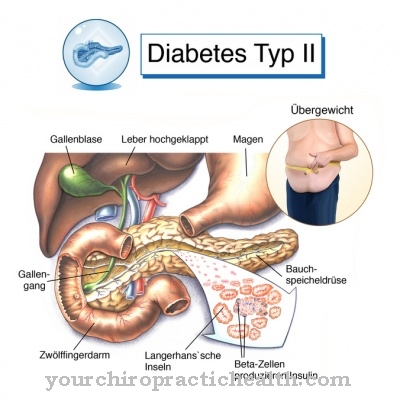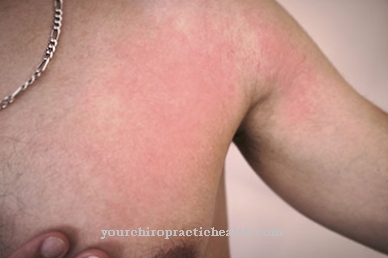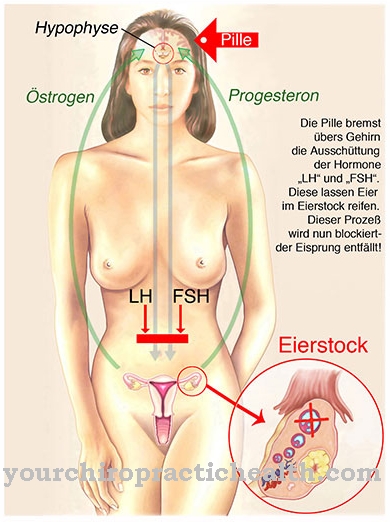Grinding teeth, or also Bruxism, describes the clenching or grinding of teeth caused by overactivity of the masticatory muscles. Teeth grinding occurs predominantly at night and is mostly due to stress and mental overload.
What is teeth grinding?

Under Grinding teeth one understands the grinding or clenching of the teeth despite the empty mouth. This means that the crunch is not used to crush food, but is an unconscious movement of the masticatory muscles.
The high forces with which the masticatory muscles can press the teeth together cause long-term damage and signs of wear and tear on the teeth and jaw joints. In addition, there is tension in the neck and jaw area, which can ultimately also trigger headaches or tinnitus.
Teeth grinding mostly occurs at night while sleeping. However, unconscious teeth grinding can also occur during the day, for example in phases of great tension or great concentration.
causes
The causes of the Grinding teeth are mostly due to psychological tension, pressure to perform and stress or in situations in which the person concerned literally "grudges" a lot. Since the body processes stress primarily during sleep, teeth grinding is particularly pronounced at night.
In rare cases, however, misaligned teeth or poorly fitted dentures can also be the reason for teeth grinding. In childhood, teeth grinding can often be traced back to a natural process. With this, children grind their milk teeth flat and thus adapt the chewing surfaces of the teeth in the upper and lower jaw to one another.
This process is not to be regarded as pathological and should set itself at the latest with the change of teeth. Nevertheless, teeth grinding should also be observed in children in order to prevent chronic wear and tear of the dental apparatus.
Symptoms, ailments & signs
Teeth grinding often occurs primarily at night and does not initially cause any noticeable discomfort in those affected. But if the teeth grinding is not treated, the teeth are threatened with damage and the teeth grinding pain. If you bite your teeth at night, you let strong forces act on the jaw. In the long run there is a risk of abrasion of the teeth and misalignment of the bite.
The dentist can safely determine these signs. Typical complaints due to teeth grinding include pain in the jaw as well as headaches. Earaches are also not uncommon as a sign of teeth grinding. The temporomandibular joint and ear are so close together that the nerve tracts in the ear can also be affected.
If the teeth grinding continues over a long period of time, more and more complaints often develop that are not directly related to the teeth by those affected. A wrong bite sooner or later leads to severe discomfort in the neck.
The neck pain, in turn, can also cause headaches of considerable intensity. Back problems and pain in the hips can also be caused by grinding teeth and a changed bite situation. To avoid long-term damage, at the first sign of teeth grinding, an orthodontist should be consulted, who can assess the bite and initiate therapeutic measures.
Diagnosis & course
The Grinding teeth or teeth clenching is an unconscious process that the person concerned cannot perceive himself. Often the partner becomes aware of the grinding noises at night. The dentist can recognize teeth grinding by looking at typical signs of wear on the teeth.
An enlarged or tense and hardened masticatory muscles can also be determined by palpation. In a conversation between doctor and patient, further symptoms such as headache, dizziness and tinnitus are clarified if teeth grinding is suspected. Due to the enormous pressure that is applied when teeth grinding, the tooth can be ground down to the dentin if it is not treated.
This is much softer than the enamel overlying the dentin and therefore much more prone to tooth decay. Untreated teeth grinding leads to long-term damage to the tooth and dentition structure. However, if the grinding of teeth is recognized and treated, the patient does not have to fear any health restrictions.
Complications
Constant gnashing of teeth can have adverse health effects and serious complications. First of all, bruxism leads to a decrease in the tooth substance, which is usually associated with grooves (fine grooves) or tooth cracks (cracks in the hard tooth substance). Such wear and tear on the teeth causes exposed dentin and sometimes nerve pain.
In the area of the gums, teeth grinding can lead to tissue regression and, as a result, to gingivitis. This often results in periodontitis, which in turn increases the risk of jawbone degradation, loosening of the teeth or tooth loss. Broxism also puts pressure on the jaw muscles and the jaw joint.
This can lead to various complications such as chronic back pain or craniomandibular dysfunction. In the long term, bruxism also has an impact on physical and mental wellbeing. The constant rubbing and clenching of the teeth worsens the quality of sleep - fatigue, tiredness and poor concentration are the result. Chronic headaches, migraines and depression can also develop.
In the treatment of teeth grinding with a grinding splint, the crunching stimulus can be intensified under certain circumstances, especially with badly adjusted splints. From this point on, the prescribed sedatives and alternative active ingredients from homeopathy can cause various side effects and interactions.
When should you go to the doctor?
The grinding of your teeth indicates an irregularity in the mouth or jaw area. A doctor should therefore be consulted as soon as the person concerned is aware of the process. In a large number of cases, teeth grinding occurs during night sleep. Therefore, it often goes unnoticed for a long time. If the person concerned is informed of the noise development during the night by the partner or family members, a visit to the doctor is advisable. In addition, if there are complaints in the mouth, the irregularities should be clarified. If the person concerned wakes up exhausted, has a headache or if the jaw hurts, the cause must be clarified.
A doctor should be consulted so that medical tests can be carried out and a diagnosis can be made. If the person concerned notices changes in the teeth, if there is a feeling of pressure inside the mouth or if the gums are frequently bleeding, the observations should be discussed with a doctor. These are the first warning signals from the organism that should be followed up. If there are irregularities in the chopping of the food in the mouth or if the person concerned suffers from hypersensitivity, a visit to a doctor is advisable. Since the grinding of teeth often leads to irreversible consequential damage if left untreated, it is advisable to consult a doctor as soon as the first signs appear.
Treatment & Therapy
As a causal treatment, stress reduction is one of the essential therapies Grinding teeth. Autogenic training, progressive muscle relaxation or yoga can be helpful here. Talking to a psychologist can also help.
The dentist can also prescribe a bite guard. This is made of plastic and is inserted into the mouth while you sleep. The teeth are separated by a kind of protective layer, which means that, despite the nocturnal grinding, there are no longer any signs of wear on the teeth. Warmth and massages can also relax the muscles.
Successful treatment of teeth grinding can only take place if the patient is aware of this and also during the day observes whether and in which situations they press their teeth together. The goal is to stop the acute pressing and avoid the stressful situation in the long term.
If the teeth grinding is due to a misalignment, gymnastic exercises for the jaw area help to bring the jaw back into a correct posture. Further treatment by an orthodontist may also be recommended. Ill-fitting dentures must always be adjusted by a dentist.
You can find your medication here
➔ Toothache medicationprevention
Grinding teeth can be prevented by avoiding stress. The application of various relaxation techniques and becoming aware of your own life situation are essential. Stressful factors in life should be eliminated as far as possible and positive influences strengthened. In principle, it is about a balanced relationship between tension and relaxation and a conscious handling of stressful situations.
You can do that yourself
The patient can also do something about his annoying grinding of teeth himself. This includes in particular the practice of relaxation methods such as yoga. Corresponding courses can u. a. learn at the adult education center. If the relaxation techniques are practiced over a longer period of time, they contribute positively to the improvement of the symptoms. This gives them the advantage of loosening muscle cramps, which are often caused by stress. The relaxation methods can also be carried out within your own four walls. It is advisable to do them before going to sleep, which will help ensure a relaxed night's sleep.
Special exercises against dental stress are also considered helpful. They stimulate and strengthen the body's self-healing powers. First the head is loosened and then left hanging for around ten minutes. In this way the neck can be stretched. The nerves are also relieved, which in turn has a positive effect on the spine. The next step is to swing the head up and down. The back is then pressed firmly in the upper and lower directions. This exercise relieves pressure on the nerves in the spine.
Massage or physical therapy exercises are also helpful for loosening the jaw muscles. But changes in lifestyle that are permanent can also prevent new complaints from grinding teeth. This includes, for example, avoiding stimulants, nicotine, caffeine and alcohol.


.jpg)





















.jpg)



